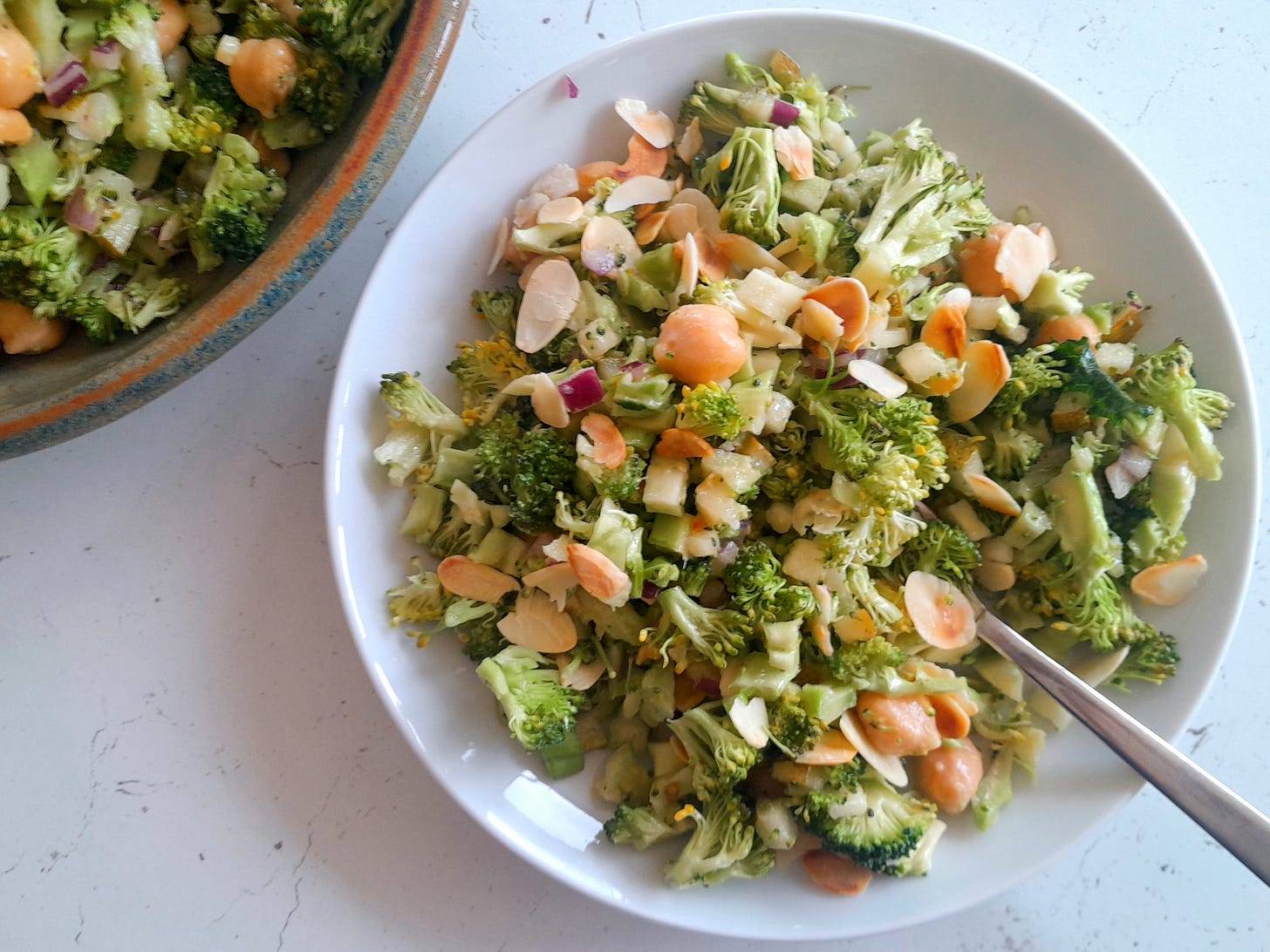Thinking of detoxing?
Do we really need to detox or is it just a fashionable fad? Tips for boosting brain function, plus Broccoli Chopped Salad.
Happy New Year! It’s that time again. January, the month of wellness programmes to ‘get you back on track’, detox cleanses after weeks of excess, discounted gym memberships to hook you in, and healthy eating regimes that involve little more than salads and juices to help you drop the festive pounds. But honestly, all of that is the last thing you need in perimenopause. Managing symptoms is hard enough without food rules, restrictions and guilt. You know what? It really doesn’t matter if you don’t jump straight back into a regular exercise regime or you’re still finishing that box of chocs. Instead, if you need it, you have my permission to take January off — take it slow, get back into routines after the chaos of Christmas, take time to do something for you and be kind to yourself.
In this month’s edition of Midlife Bites, I ask: despite what social media will lead you to believe, do we actually really need to be going on a ‘detox diet’? (spoiler: not so much). We must all remember that your body is amazing and it has a well-developed, in-built detoxification system. Healthy eating is all about providing your body with an abundance of nutrients to help it to function at its best and to thrive.
Brain fog, lack of concentration, low mood, there are so many symptoms of perimenopause that relate to brain function, so making sure that we’re doing what we can through diet to support our brain is so important for our physical and mental health. In this month’s healthy habits, I share three simple tips for boosting your brain function through food.
If I was to pick one vegetable to include every day to support your hormones through perimenopause, it would be broccoli (cauliflower comes a close second!). I try to include it in as many meals as possible: grated into porridge or pancakes, blitzed into smoothies, in pesto, roasted, steamed or simply raw in a salad. As well as being a good source of fibre and essential vitamins and minerals, broccoli is rich in a compound called indole-3-carbinol, which helps the liver metabolise and detoxify excess oestrogen, supporting hormone fluctuations. The simple Broccoli Chopped Salad recipe in this month’s issue is a great addition to your plate; it also keeps well in the fridge if you want to pre-make it at the beginning of the week.
For paid subscribers, I’ve created a perimenopause symptom tracker for you to download and use — by keeping track of how you’re feeling, you’ll be able to see how your symptoms develop over time. This will also help you to find the right kind of support to suit you. On the theme of detoxification, I’ve also included my favourite non-toxic cookware to help lessen the burden of excess toxic load on your liver.
As always, I’d love to hear from you if you’re interested in working together, or if you have any questions or comments — either hit reply or book a free 1-to-1 chat.
Do we really need to detox?
Detox. The wellness world loves it. Everywhere you look, there’s someone trying to convince you that the answer to all of your health problems is to detox. Around 20 years ago, The Lancet published an article titled Detox: The Mass Delusion, which basically argued that the idea of detox is total nonsense. It states that the theory we’re sold is pretty simple — we’re all constantly accumulating toxins which are affecting our physical and mental health and the only way we can get rid of this toxic waste is by, every so often, following a ‘detox diet’ or by drinking detox teas. But actually it’s all just a fad. ‘Detox diets’ can involve anything from: fasting for certain periods of time; cutting out particular food groups; eating only a limited range of foods; or consuming pills, powders or drinks. The thing is, your body has its own in-built ability to detoxify, and remove waste and toxins, without the need for a miracle cure or magic regime.
But how does it work? Well, your liver is central to your body’s detoxification abilities. It performs many functions in the body, including filtering and cleaning the blood, storing energy, balancing hormones (which is particularly important in perimenopause) and helping with digestion. It processes nutrients from food to eliminate toxins that are naturally produced by the body (called endotoxins), as well as toxins that are picked up through the environment, diet and lifestyle (called exotoxins). It works through a series of processes to do this, known as phase 1 and phase 2 detoxification.
Phase 1 detoxification is when your body starts breaking down fat-soluble toxins into less harmful chemicals. But in this process, it creates free radicals which can be damaging unless you have enough antioxidants (like vitamins C and E) to neutralise them. If you don’t, these free radicals may harm your liver cells. Plus, if your body doesn’t have enough nutrients to support Phase 2 detoxification, then half-processed toxins may build up and you may start to experience negative symptoms.
Phase 2 is where the body packages these toxins up to get rid of them. For everything to work well, you need a good balance of nutrients for both phases. These include: amino acids from protein and nutrients such as B vitamins, magnesium, iron, zinc, antioxidants including vitamins A, C and E (from wholegrains, green leafy vegetables, nuts, seeds, legumes, berries) and sulphur-containing compounds (found in eggs, onions, garlic). Don’t forget water and fibre as they’re also essential in the process of eliminating toxins. To help your detoxification system, it’s also wise to cut back on anything in your diet that may add extra toxins like processed or fried food, sugary drinks or snacks and caffeine.
If you’re fasting or following a restrictive ‘detox diet’ you’re likely missing out on some of the important nutrients you need for optimal detoxification, health and overall wellbeing. Your body is also missing out on the fuel it needs to thrive. So, instead of cutting things out of your diet or investing in fancy detox cures, you’re better off focusing on a balanced diet full of fruit, vegetables, wholegrains, good-quality protein, nuts, seeds, legumes and healthy fats; as well as sufficient sleep, exercise hydration, time in nature, and reducing alcohol and caffeine. This simple strategy will help support your body’s own well-developed detoxification system for the long-term.
If you’ve been considering going on a detox, or would like to learn more about how to support your perimenopause symptoms through diet and lifestyle, please do get in touch, I’d love to chat!
To boost brain function
Brain function is crucial for both physical and mental health, no matter your age. But looking after your brain is particularly important as we grow older — around 60% of women report cognitive changes during perimenopause, including shifts in mood, memory and focus. Why is this? Oestrogen actually plays a vital role in brain health, so as levels of this hormone fluctuate, neurotransmitters including serotonin and dopamine may be affected, impacting mood, memory and concentration. It’s not just oestrogen though, the significant decrease in progesterone that happens in perimenopause may also affect sleep quality and emotional regularity. But the good news is that there are many things that we can do in terms of diet and lifestyle to help support brain function during perimenopause — here are three habits to help:
Don’t be afraid of fat. In the old days, healthy food messaging was all about low-fat everything, but actually healthy fats, like extra virgin olive oil, nuts, seeds, avocado, and oily fish, are a crucial part of our diet. Healthy fats are essential for hormone production, important for absorbing certain nutrients; plus 60% of your brain is made up of fat. Try to use around four tablespoons of extra virgin olive oil per day; snack on nuts and seeds; sprinkle ground flaxseed on yoghurt or porridge, and enjoy two portions of oily fish (mackerel, salmon, anchovies, herring, sardines, trout) per week. If you don’t eat fish, consider an omega-3 supplement.
Control your blood sugar. Your brain uses 20% of your body’s energy and it relies on a steady supply of glucose (its main energy source) to function properly. When blood sugar levels fluctuate too much outside of your normal range, this energy supply may be disrupted, affecting your cognitive and emotional health. Aim to include a portion of protein with every meal; eat more fibre; include healthy fats; choose carbs with a low glycaemic index; and limit sugary snacks and drinks.
Embrace colour. Eating a wide variety of colourful fruit and vegetables means that you’ll be consuming a synergistic mix of antioxidants, vitamins, and phytochemicals that protect the brain from oxidative stress, support cognitive function, and promote overall mental wellbeing. Aim to include multiple colours in every meal to benefit from a diverse range of nutrients and try to focus on fresh, seasonal produce.
If you’re interested in working with me on a 1-to-1 basis, why not book a complimentary chat to find out more about how I can support you through perimenopause. And if you’re on Instagram, come and say hi.
Broccoli Chopped Salad
Serves: 4 to 6 (as a side) | Time: 20 minutes
I love broccoli — a lot! It’s particularly great to include in your diet during perimenopause as it provides nutrients and compounds that support hormonal balance, bone health and overall wellbeing. It contains plant-based compounds called phytoestrogens, which can mimic oestrogen in the body, helping to balance fluctuating hormone levels, potentially alleviating symptoms like hot flushes and mood swings. Broccoli is also a good source of calcium, magnesium and vitamin K, which are essential for maintaining strong bones. It’s also a great source of fibre — a must for healthy digestion and weight management. This recipe basically just involves chopping, so it’s super-simple, quick and tasty!
INGREDIENTS
1 large head broccoli, cut into small florets & sliced
1 red onion, finely diced
1 x 400g tin chickpeas, drained & rinsed
1 pear, diced
50g flaked almonds, toasted
For the honey & mustard dressing:
3 tablespoons extra-virgin olive oil
2 tablespoons apple cider vinegar
1 tablespoon Dijon mustard
1 tablespoon maple syrup/honey
1 clove garlic, minced
METHOD
In a large bowl, mix together all of the salad ingredients.
To make the dressing, whisk together all of the ingredients until well combined.
Drizzle the dressing over the salad, toss and serve.
Is it perimenopause or something else?
There’s no test for diagnosing perimenopause. Instead, the gold standard is to simply track your symptoms. But is there a best way to do that?
Keep reading with a 7-day free trial
Subscribe to Midlife Bites to keep reading this post and get 7 days of free access to the full post archives.












